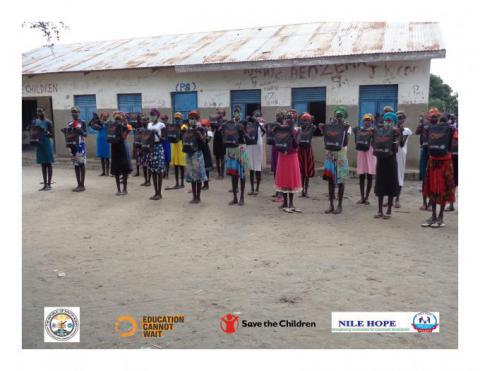Dignity kits improve enrolment and retain girls in school.

School girls in Gaitut Primary school, Nyirol County, display their dignity kits distributed by Nile Hope on 28th 0ct, 2020. Photo: Nile Hope
Jonglei State, South Sudan – After schools were closed in South Sudan as a measure to prevent the spread of COVID-19 in April 2020, the seven months of staying at home resulted into a number of challenges to girls who have been made vulnerable due to poverty and protection. Hundreds of underage school girls were impregnated in South after schools were closed according to the Ministry of General Education and Instruction (MoGEI).
18 years old Ayen*, a Primary Eight student is among many girls who have had to stay at home following the closure of schools due to COVID-19 pandemic. After the government reopened schools for candidate classes, it was hard for Ayen to start classes. Ayen says she doesn’t have soap and pads among others that could aid her in maintaining high levels of hygiene in school. Because of this, Ayen could not attend a number of classes. She is among many other girls who at their own cost cannot afford the dignity kits.
This not only made Ayen to miss her school lessons but equally, made her have low self-esteem and lack of confidence while undertaking her studies. Lack of dignity kits is a perennial problem to girls who have reached adolescent age in South Sudan.
In October, Nile Hope with support from Save the Children through South Sudan Multi-Year Resilience Programme (MYRP) funded by Education Cannot gave Ayen hand bag, re-usable sanitary pads, pair of slippers, bar soap, toothbrush, toothpaste, torch, petti coats, under-garments; so that she can stay in school. 700 dignity kits were distributed to girls in Nyirol County, Jonglei State. The hygiene kits were dispersed after the government reopened candidate classes including Primary Eight. Adolescent girls who are yet to resume classes were also mobilized by the School Management Committee (SMC) members to receive the support.
“This dignity kit is going to help me to attend the classes without fail or being absent from school; even other girls who dropped out of school can come and benefit and be helped to come back to school”, says Ayen.
In South Sudan, 52 percent of girls are married before their 18th birthday and 9 percent marry before clocking 15 years. 45 percent of girls are married before the age of 18, placing South Sudan as one of the countries with the highest prevalence of child marriage worldwide.
Ministry of General Education and Instruction (MoGEI) and partners through South Sudan Multi-Year Resilience Programme (MYRP) funded by Education Cannot Wait enables girls to access basic education, improve school attendance and deter any possible drop-out of girls from school. School girls will continue to receive support once classes re-open.
Written by Isaac Otieno/ Nile Hope
Edited By Tito Justin/Save the Children
 South Sudan
South Sudan